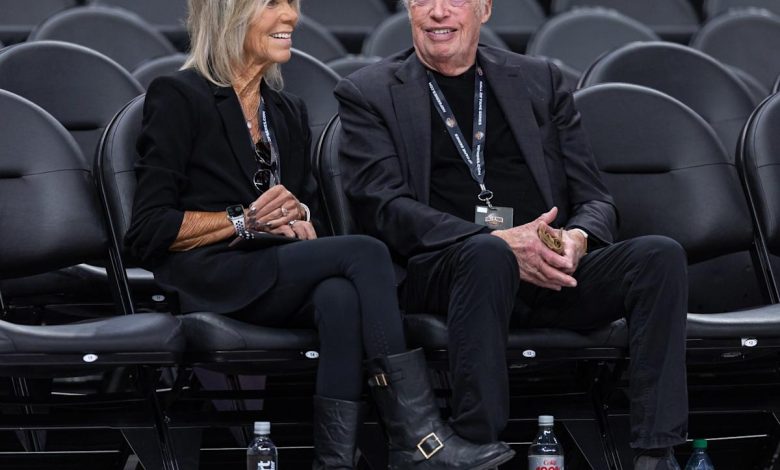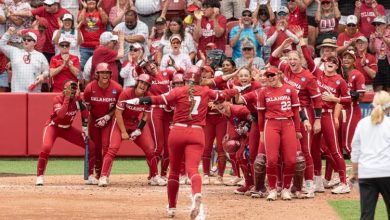Some of the billionaires funding the largest schools in March Madness include the inventor of Nike, a Walmart heiress, and the owner of the Dallas Cowboys.

Some of the Billionaires Funding the Largest Schools in March Madness: The Inventor of Nike, a Walmart Heiress, and the Owner of the Dallas Cowboys
The NCAA Tournament, known affectionately as “March Madness,” is one of the most anticipated sporting events of the year, drawing millions of viewers, passionate fans, and intense competition. Behind the excitement of buzzer-beaters, Cinderella stories, and heart-pounding finishes is a deeply ingrained culture of investment in college athletics, especially basketball. Schools competing in March Madness often operate with massive budgets, many of which are bolstered by wealthy donors and high-profile figures in the business world. Some of these donors are not just local philanthropists or alumni, but rather some of the wealthiest individuals in the world, whose financial support has helped elevate their universities to national prominence on the basketball court.
Among the key figures financing college basketball programs are billionaires with vast business empires that have left an indelible mark on their industries. Whether it’s Nike’s founder, a Walmart heiress, or the owner of the Dallas Cowboys, these billionaires have used their wealth to support schools that are consistent contenders in March Madness, driving success not just through donations, but through deep involvement in shaping the future of collegiate sports. This blend of athletic dominance and financial power speaks to the growing intersection of business, sports, and education in today’s society.
Nike’s Phil Knight: The Billionaire Who Revolutionized Sportswear and College Athletics
When one thinks of the intersection of business and college basketball, few names stand as tall as Phil Knight, the founder of Nike. Knight’s brand has become synonymous with sports culture, but his influence extends far beyond the realms of sneakers and apparel. The Oregon native’s connection to the University of Oregon, the school where Nike originated, runs deep—both as a longtime supporter and as a key figure in the development of the university’s athletics program.
Phil Knight’s relationship with Oregon began when he was a student at the university and became close with legendary track coach Bill Bowerman, who helped him develop his first prototype of what would later become the famous Nike shoe. Over time, Knight built Nike into a global powerhouse and, through the success of his company, became one of the richest men in the world. His business ventures have had a significant impact on the University of Oregon, one of the schools he holds in the highest regard. Knight’s financial support of Oregon’s athletic programs is well-known, particularly when it comes to the university’s basketball program.
Knight’s contributions go far beyond just money. He has funded the construction of state-of-the-art facilities, provided sponsorships for players, and elevated Oregon’s profile through his investments. In 2012, Knight gave $100 million to the university, which funded the construction of the state-of-the-art Matthew Knight Arena, where the Ducks play their home basketball games. This incredible donation helped Oregon attract top-tier recruits and made the program a mainstay in the NCAA Tournament. Knight’s impact on Oregon’s basketball program is clear—his ability to leverage his business empire has transformed the Ducks into a regular contender in March Madness.
Knight’s influence goes beyond just Oregon. Nike has deals with many schools across the nation, providing uniforms, apparel, and even sponsorships that elevate the profile of these institutions. With Knight’s resources behind them, schools like Oregon, Duke, and Michigan State are able to attract top-tier talent and build championship-caliber programs. It’s clear that Knight’s legacy will continue to shape the future of college basketball for years to come.
Alice Walton: The Walmart Heiress Helping Propel Arkansas Athletics
Another billionaire whose influence extends into the college basketball world is Alice Walton, the heiress to the Walmart fortune and one of the wealthiest women in the world. Walton’s financial impact on college athletics, particularly in her home state of Arkansas, has made her a pivotal figure in the university’s sports success. The University of Arkansas, where Walton is a major donor, is another school with a proud basketball tradition, and her contributions have helped the program grow into one of the most competitive teams in the NCAA.
Born into the Walton family, who built Walmart into one of the largest retail companies in the world, Alice Walton made her fortune through her family’s holdings, yet she’s also become a passionate supporter of the arts, education, and sports. Walton’s philanthropic work focuses on a variety of causes, but her ties to Arkansas basketball are particularly significant. She has donated millions to the university’s athletic programs, and her financial support helped fund the construction of the Donald W. Reynolds Razorback Stadium and improvements to the Bud Walton Arena, the home of the Razorbacks’ basketball team.
Walton’s support has been instrumental in giving the Razorbacks the resources they need to attract top-tier talent and stay competitive in one of the most high-pressure conferences in college basketball, the Southeastern Conference (SEC). Her commitment to Arkansas basketball has ensured that the program has the resources to recruit and train elite athletes while also providing fans with a world-class experience.
For the Razorbacks, Walton’s financial backing has been vital in sustaining a level of excellence that has led to consistent NCAA Tournament appearances. Walton’s influence also reflects a growing trend in college athletics: the increasing role of wealthy donors in shaping the future of these programs. With Walton’s guidance, Arkansas has remained a force in the SEC and a perennial contender in March Madness.
Jerry Jones: The Dallas Cowboys Owner Supporting the University of Arkansas
While Alice Walton has made her name known through her family’s business, the Walton fortune, another influential billionaire with ties to Arkansas and the NCAA Tournament is Jerry Jones, the owner of the Dallas Cowboys. Jones, who made his fortune in oil and real estate before purchasing the Cowboys in 1989, is another key figure in the financial landscape of college basketball. Like Walton, Jones is deeply invested in the University of Arkansas, and his financial support of the school has played a significant role in its basketball success.
Jones, a longtime resident of Arkansas, has remained a steadfast supporter of the University of Arkansas’ athletic programs, particularly basketball. His contributions, which include significant donations to facilities and program development, have helped ensure that Arkansas is able to compete at the highest level. Though Jones is perhaps best known for his role as an NFL owner, his support of Arkansas athletics shows the broader influence of wealthy individuals on the success of college sports programs, particularly those with high-profile basketball teams.
Through his donations, Jones has not only supported the Razorbacks’ basketball team but has also helped enhance the university’s sports culture overall. His financial contributions have funded critical infrastructure projects and helped solidify Arkansas as a premier destination for recruits looking to make a name for themselves in the SEC and the NCAA Tournament.
The Growing Influence of Billionaires in College Athletics
As the role of billionaires like Phil Knight, Alice Walton, and Jerry Jones in college basketball demonstrates, the financial landscape of the sport has changed dramatically in recent years. What was once a system driven by traditional alumni donations and small boosters has now evolved into a billion-dollar industry, with wealthy individuals leveraging their resources to propel their alma maters and other schools into contention.
These billionaires have recognized the influence that successful sports programs can have, both in terms of enhancing their brand and bringing national attention to their schools. For Knight, supporting Oregon basketball has helped elevate his Nike brand, while Walton’s donations to Arkansas have created a sense of pride and identity for the Razorbacks and their fans. In Jones’s case, supporting Arkansas is an extension of his deep ties to the state and his desire to see the university thrive. In each case, these figures are using their wealth to shape the future of college basketball in a way that ensures their programs remain relevant and competitive.
However, this trend also raises questions about the future of college athletics. As the financial stakes continue to rise, the influence of billionaires and corporate entities on college sports will only grow. This influence can lead to both positive and negative outcomes—on the one hand, more resources and better facilities for players, but on the other, concerns about the commercialization of college athletics and the impact on the student-athlete experience. The debate over compensation for college athletes, the role of big-money donors, and the power of corporate sponsorships are ongoing discussions that will continue to shape the landscape of college basketball.









